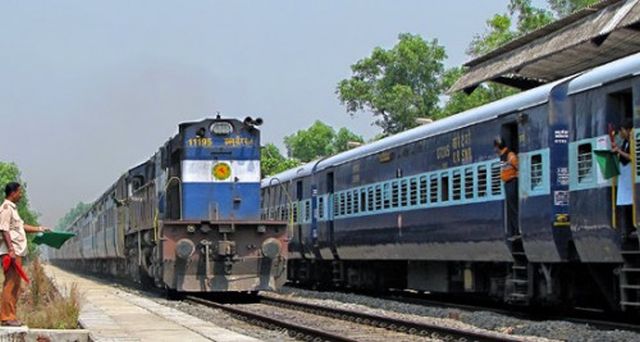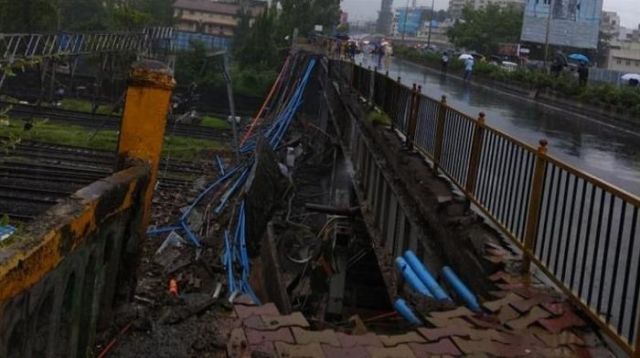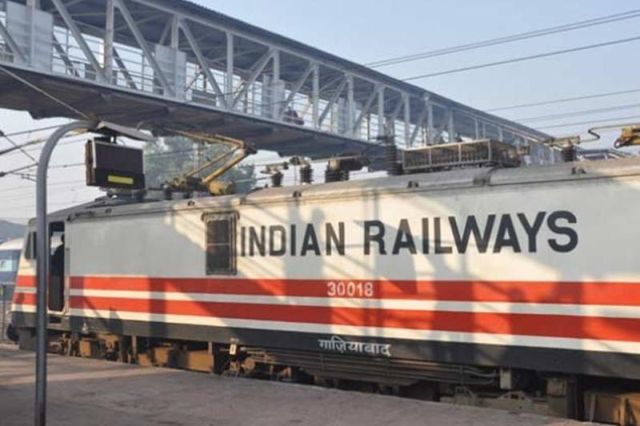
by admin | May 25, 2021 | Corporate, Corporate Governance
 By Arun Kumar Das,
By Arun Kumar Das,
New Delhi : Despite the massive track repair and maintenance work being undertaken by the Indian Railways, the instances of train derailment have gone up as compared to the past.
While there were 20 cases of derailment between April 1, 2017, and August 9, 2017, the number has gone up to 22 for the corresponding period this year — April 1 to August 9, 2018 — according to Railways data.
Since derailments are caused due to track defects, including weld failures and rail fractures, Railway Minister Piyush Goyal has put special emphasis on strengthening tracks by replacing the aging rails with new ones.
In fact, laying new lines is not the priority now as it has been replaced by track renewal to prevent derailments.
“Track renewal is going on full steam across all zones,” a senior Railway Ministry official told IANS.
However, he noted that the ongoing track strengthening work has affected the train schedules as the Railways have to regulate the movement on the particular route to facilitate track repair.
“There are speed restrictions at many places due to the ongoing track maintenance work, affecting the punctuality rate,” said the official, adding this was done to make train rides safer.
According to the Railways punctuality data, North Central zone is at the lowest with 48.82 per cent punctuality rate during the July 30 to August 5, 2018, period, followed by the Northern and South East Central zones, with 56.86 per cent and 60.12 per cent, respectively.
The Lucknow and Allahabad divisions are also bottom of the punctuality performance with 31.94 per cent and 39.75 per cent, respectively.
“Our first priority is passenger safety and for that track renewal is going on all over the country. Though the exercise is causing some delays for some time, it has to be carried on for making train journeys safer,” said the official.
Asked why derailment cases are on the rise despite track renewal, the official said, “We have to analyse the incidents to know the real cause.”
However, the official said the derailments have not caused any casualty or serious injuries to passengers as most of these incidents have happened near stations when train speeds are low.
Besides track renewal, the Railways is also acquiring the Vehicular Ultrasonic Flaw Detection (USFD) system to detect track faults at a faster pace. Currently, it is detected manually which takes longer time to complete a particular route.
The USFD can detect the flaws in the primary stage and all developed countries have the system to avoid the human element in detecting cracks on rails.
(Arun Kumar Das can be contacted at akdas2005@gmail.com)
—IANS

by admin | May 25, 2021 | Business, Corporate, Corporate finance, Corporate Governance, Economy, Large Enterprise, News
 By Arun Kumar Das,
By Arun Kumar Das,
New Delhi : Taking note of the increasing amount of pension and losses in the passenger buisness, a parliamentary committee has suggested rationalisation of train fares while advocating that the Finance Ministry should partly bear the pension liability of the Indian Railways.
The cash-strapped Railways — one of the largest public-sector employers — is currently reeling under the impact of pension payment which is at the moment around Rs 50,000 crore annually, while the losses in passenger segment is touching Rs 35,000 crore.
In a report to the Parliament, the Railway Convention Committee (RCC) reviewing the internal resource generation, has also recommended that the Railways should periodically revise and rationalise train fares to increase passenger earnings in the wake of these losses.
According to the Railways, the losses are primarily because passenger fares have not been increased for long, though fares have been raised in certain category of train for limited passengers.
“Taking into account the whopping loss of revenue in passenger services coupled with an operating ratio of 98.5 per cent, the committee is of the considered opinion that the Railways have ultimately to undertake gradual or periodical fare rationalisation, besides embarking upon other requisite measures to increase passenger earnings,” the RCC report said.
The panel has also asked the Railways to make a segregated assessment of the actual revenue benefits accrued through the introduction of the flexi-fare system, which is “sometimes reportedly at par with air fares in economy class”.
Expressing its deep concern over the shortfalls in earnings, the committee has found that during the last five years — from 2013-3014 to 2017-2018 — there have been shortfalls on the part of the Railways in achieving internal revenue generation targets, except in 2014-2015.
During 2013-2014, 2015-2016, 2016-17 and 2017-2018, the shortfall was of Rs 2,828 crore, Rs 769 crore, Rs 2,782 crore and Rs 8,238 crore, respectively.
For the Railways, with its over 13 lakh employees, it is only the ministry which bears its pension liability and for everyone else it is borne by the Ministry of Finance while the passenger operation is cross-subsidised with the earnings from the freight service.
“I would like to submit here that when it comes down to devising the salary structure and the pension structure, the Ministry of Railways has no say in that. The decision is taken by (a) different ministry, irrespective of whether it is Rs 3,000 crore, Rs 5,000 crore, Rs 10,000 cr, it is the Ministry of Railways which is expected to generate these additional resources,” Chairman, Railway Board, has stated to the committee.
The committee, headed by Biju Janata Dal (BJD) MP Bhartuhari Mahtab, has found some merit in the contention as the huge impact of the pension liability is adversely affecting internal resource generation by the Railways.
Taking into consideration the merger of the Rail Budget with the Union Budget, the committee has suggested the Railways take up the matter with Finance Ministry and other appropriate authorities so that at least a part of its pension liability is borne by the Finance Ministry.
(Arun Kumar Das can be contacted at akdas2005@gmail.com )
—IANS

by admin | May 25, 2021 | Corporate, Corporate Governance, News, Politics
 Mumbai : After Railway Minister Piyush Goyal cracked the whip, the Western Railway (WR) launched a safety audit of all 445 bridges on the Mumbai suburban section, deploying modern techniques to scan some of the oldest structures, an official said here on Saturday.
Mumbai : After Railway Minister Piyush Goyal cracked the whip, the Western Railway (WR) launched a safety audit of all 445 bridges on the Mumbai suburban section, deploying modern techniques to scan some of the oldest structures, an official said here on Saturday.
The first to be inspected and audited was the 98-year old Mahalaxmi road overbridge (ROB) and later the Bandra ROB, with the new time-saving technique through the “tower wagon car”.
“The tower wagon has been designed to save inspection time to two hours against the normal four hours by conventional methods and even perform urgent repairs,” said WR spokesperson Ravinder Bhakar.
Conventionally, a long ladder was transported from Lower Parel station to the required station, shifted manually to the bridge site and only one person at a time could climb it, while clutching a load of equipment. The ladder needed to be shifted continuously for examining each girders, pillars or spans.
However, the new tower wagon allows the entire inspection team to climb to the targeted site armed with tools and machinery, and even carry out spot emergency repairs, making it a quick, safe and quality process, said Bhakar.
On the WR’s Churchgate-Virar sector, there are 29 ROBs, 110 Foot overbridges (FOBs) and four pipeline bridges, and the rest are on the Central Railway (CR), across Mumbai, Thane, Palghar and Raigad districts, catering to over eight million daily suburban commuters.
Top WR officials including General Manager A. K. Gupta, Divisional Railway Manager Sanjay Mishra, Principal Chief Engineer R. K. Meena and Chief Safety Officer Manoj Sharma were present when the inspections were carried out in the early hours on Saturday.
Spelling relief, the Mahalaxmi ROB was found to be “structurally sound and in safe condition” at all its 15 girders and five spans after it was inspected in minute details by two tower wagons.
The 56-year old Bandra ROB with 13 girders and three spans was also found structurally safe and sound, the WR said.
Bouyed by the results, the WR will now carry out the safety audits of all the remaining bridges with tower wagons over the next three-four months, as resolved at a high-level meeting on July 5.
Following stringent observations by the Bombay High Court, a public uproar after the July 3 crash of a portion of the Andheri FOB which killed one woman, the beleagured WR, CR, BrihanMumbai Municipal Corporation along with IIT-Bombay experts launched the full-scale bridges’ audits.
It was decided to order repairs or reconstruct the stressed bridges on priority without procedural delays, with precedence given to the oldest structures, while ensuring complete coordination among various agencies.
The three organisations will also conduct regular monthly meetings of top officials, clear issues about designs, drawings, approvals, land issues, etc, to speed up the required works.
They would also explore the feasibility of creating a special corpus fund for the purpose of an appropriate amount, to ensure financial resources are readily available, especially for undertaking works of urgent nature or in emergencies.
—IANS

by admin | May 25, 2021 | Corporate, Corporate Governance, News
 By Arun Kumar Das,
By Arun Kumar Das,
New Delhi : Joining the battle against plastic waste, Indian Railways is installing plastic bottle crushing machines at 2,000 stations across the country.
“At a time when plastics in general, and plastic bottles in particular, are being widely recognised as being extremely harmful for the environment, we are undertaking concrete steps to raise awareness to battle the plastic menace,” a senior Railways official involved in the cleanliness drive at stations told IANS.
There is a huge consumption of plastic bottles for cold drinks and water every day at stations across the country.
According a report in 2009 by the Comptroller and Auditor General, approximately 6,289 tonnes of plastic waste is discarded onto India’s railway tracks.
The installation of crushers is a step is to prevent travellers from throwing used plastic bottles on the tracks or in the station premises.
The crusher machines would be installed at platforms and at exit points so that passengers who want to discard their plastic bottles can deposit them in the flaking machine. Depending on the volume of plastic bottles deposited the machine automatically starts and stops. The inserted bottles disintegrate into fine pieces of plastic which is then released from a different outlet.
The plastic pieces will be given to the plastic manufacturers, thus saving the landfills from additional plastic pollutants.
All 16 zones and 70 divisons have been instructed to install the plastic bottle crushing machines at 2,000 stations in the first phase, said the official.
Currently empty plastic bottles are disposed off manually.
There is a need to curb garbage thrown on tracks either by rail commuters or by those staying in illegal slums along the tracks.
The railways has given RITES the responsibility of providing project management consultancy for selecting the agencies for installing and maintaining the crushers.
While smaller stations will be covered under corporate social responsibility spends, the rest of will be done through competetive bidding. Successful bidders will have a eight-year contract to ensure viability and upgrade technology from time to time.
(Arun Kumar Das is senior Delhi-based freelance jurnalist. He can be contacted at akdas2005@gmail.com)
—IANS

by admin | May 25, 2021 | Corporate Jobs, Employment, Government Jobs
 By Arun Kumar Das,
By Arun Kumar Das,
New Delhi : To avoid the time-consuming railway recruitment board route, Indian Railways has opened the doors for contractual engagement in certain categories against existing vacancies to tide over shortage of staff in some key areas.
Besides, it has also decided to engage retired staff for preserving and reviving railway heritage properties such as steam locomotives, vintage coaches and signals, among others.
“Since these retired employees are equipped with the skills to handle steam engines, semaphore signals and other steam-powered equipments, they can be re-hired to do the job on contract,” a senior Railways official told IANS.
Zonal heads are being empowered to engage retired employees having adequate skills for consulting and guiding the process of revival and preservation of heritage items.
To mitigate problems arising out of acute shortage of stenographers/PAs affecting efficient functioning of offices, the railways have allowed hiring of data entry operators or executive assistant against an existing vacancy of stenographer on contractual basis, according to the latest Railways order.
“Zonal heads have been authorised to finalise the number of persons to be hired against such vacancies in consultation with concerned departments and the proposed remuneration shall be commensurate with the general work schedule of such hired personnel,” the official said.
Considered to be part of the reform measures being undertaken to improve functioning in the public sector behemoth, a series of steps is under active considerations to unfold in near future.
The upper age limit for engagement of retired railway staff is 65 years.
Earlier, the railways had decided to re-hire retired staff at unmanned level crossings.
(Arun Kumar Das is a senior Delhi-based freelance journalist. He can be contacted at akdas2005@gmail.com )
—IANS





